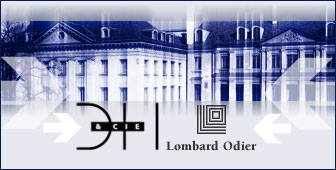
Switzerland’s oldest private banks to tie the knot

Two Geneva-based banks, Lombard Odier and Darier Hentsch, are to merge in a deal that will create an institution with combined assets of SFr140 billion ($89 billion).
The announcement comes during a period of consolidation in the private banking sector, which is facing increasing competition from bigger banks, and pressure from weak financial markets. The two banks had denied earlier media reports that they were about to merge.
Analysts say they needed a merger because both are too big to be niche players and too small to compete with rivals such as UBS.
“The problem is information technology costs,” said Claude Zehnder, an equity analyst at Zurich Cantonal Bank, adding that private banks were also struggling because there are too many of them chasing increasing jittery investors.
Both Lombard and Hentsch belong to a shrinking number of banks which operate as private partnerships. That means the partners shoulder unlimited liability.
Analysts say this closed structure limits banks’ ability to grow rapidly, cut costs or tap the markets for cash.
Another problem is that bigger banks are becoming increasingly interested in the “elitist” sector – where clients must have at least SFr1 million to invest – as profits from retail banking dry up.
Layoffs
The merger is expected to cost nearly 200 jobs, with Hentsch likely to lay off some 30 people from its worldwide workforce of 560. Swiss media reports say Lombard could cut up to ten per cent of its 1,530 staff.
The two banks, both of which trace their origins back to the late 18th century, will reportedly have a combined staff of approximately 1,800.
The merger comes on the heels of a similar deal between Basel-based Bank Sarasin, which earlier this year sold a 28 per cent stake to Rabobank of the Netherlands.
Political pressure
Private banks worldwide are coming under pressure to be more transparent about their activities, as the European Union and the United States seek to clampdown on “offshore” financial centres, of which Switzerland is the biggest.
The EU is insisting that such centres reveal the income of EU citizens’ assets so it can tax them appropriately – a demand Switzerland is fiercely resisting. The US is concerned that “offshore” centres provide an easy way for terrorists to move funds, although it says it is happy with Switzerland’s system of checks and balances.
By Roy Probert and Robert Brookes

In compliance with the JTI standards
More: SWI swissinfo.ch certified by the Journalism Trust Initiative




























You can find an overview of ongoing debates with our journalists here . Please join us!
If you want to start a conversation about a topic raised in this article or want to report factual errors, email us at english@swissinfo.ch.